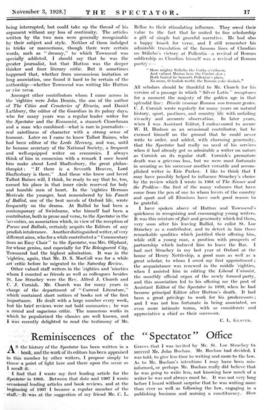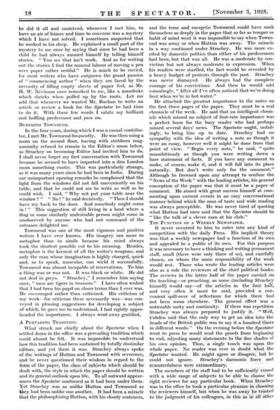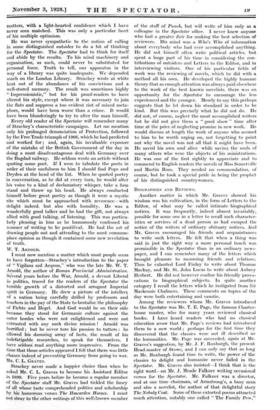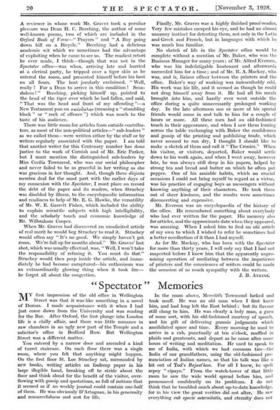Reminiscences of the- " Spectator Office A S the' history
of the Spectator has been written in a book, and the work of its editors has been appraised in this nuniber by other writers, I propose simply to throw a point of light here and there upon the scene as I recall it. • - • I find that I wrote my first leading article , for the Spectator in 1903. • Between that date and 1907 I wrote occasional leading articles and book reviews, and at the beginning of 1907 I became a regular member of the staff. :was at the suggestion of my friend Mr. Graves that I was. invited .by Mr. St. Loe Strachey to Succeed Mr. John Buchan. Mr. Buchan had decided, I was told, to give less time to writing and more to the law. As to Mr. Buchan's intentions I may have been mis- informed, or perhaps Mr. Buchan.really did believe that he was going to. write less, not knowing how much of a writer he was and always must be. It was not very long before I heard without surprise that he was writing more than, ever as well .as following the. law, engaging in a publishing- bUsiness: and nursing a constituency. How he did it all and contrived, whenever I met him, to have an.air of leisure and time to converse was a mystery which I have not solved. I sometimes suspected that he worked in his sleep. He explained a small part of the mystery to me once by saying that since he had been a child he had always amused himself by telling himself stories. " You see that isn't work. And as for writing out the stories I find the manual labour of moving a pen over paper rather restful." He is much to be envied, for most writers who have outgrown the grand passion of " commencing author " when they are faced by the necessity of filling empty sheets of paper feel, as Mr. H. W. Nevinson once remarked to me, like a mandrake which shrieks when pulled up by the roots. Let me add that whenever we wanted Mr. Buchan to write an article or review a book for the Spectator he had time to do it. With these few words I salute my brilliant and baffling predecessor and pass on.
MEREDITH TOWNSEND.
In the four years, during which I was a casual contribu- tor, I met Mr. Townsend frequently. He was then using a room on the second floor, having with stubborn mag- nanimity refused to remain in the Editor's room below, as Strachey on becoming Editor had invited him to do. I shall never forget my first conversation with Townsend because he seemed to have imported into a dim London room something exotic. This was particularly strange, as it was many years since he had been in India. During our unimportant opening remarks he complained that the light from the windows did not fall conveniently on his table, and that he could not see to write as well as he could wish. I said; " Why not put your table near the window ? " " No ! " he said decisively. - " Then I should have my back to the door. And somebody might come in ! " This suggestion of still- living in a land where a thug or some similarly undesirable person might come in unobserved by anyone who had not command of the entrance delighted me.
Townsend was one of the most vigorous and positive writers I have ever known. His imagery ran more to metaphor than to simile because his mind always took the shortest possible cut to his meaning. Besides, metaphor is the keenest of all the writer's weapons, and only the man whose imagination is highly charged, quick and, so to speak, muscular, can wield it successfully. Townsend was almost incapable of reservations. To him a thing was or was not. It was black or white. He did not deal in greys. " Strachey," I remember him saying once, " men are tigers in trousers." I have often wished that I had been his pupil on closer terms than I ever was. He encouraged rather than criticized. His criticism of my work—for criticism there necessarily was—was con- veyed in pleasing suggestions for •developing a subject of which, he gave me to 'understand, I had rightly appre- hended the importance. I always went away gratified, A PERVADING TRADITION.
What struck me chiefly about the Spectator when I settled down in the office was a pervading tradition which could almost be felt. It was impossible- to understand how this tradition had been sustained by totally dissimilar editors, and yet there it was. Strachey always spoke of the writings of Hutton and Townsend with reverence, and he never questioned their wisdom in regard to the form of the paper, the _class of subjects which should be dealt with, the style in which the paper should be written and its general outlook upon life.. To all outward appear- ances the Spectator continued as it had been under them. Yet Strachey was as unlike Hutton and Townsend as they, had been unlike one another., It had been a. miracle that the philosophizing Hutton, with his cloudy sentences, and the terse and energetic Townsend could have sunk themselves so deeply in the paper that so far as temper or habit of mind went it was impossible to say when Towns- end was away or when Hutton was away. The miracle in a way continued under Strachey. He was more ex- cited by domestic politics than either of his predecessors had been, but that was all. He was a moderate by con- viction but not always moderate in expression. When his readers were startled, the fact would be revealed by a heavy budget of protests through the post. Strachey was never dismayed. He always had the complete courage of his convictions. And then he would add consolingly, " After all I've often noticed that we're doing best when we're in hot water."
He attached the greatest importance to the notes on the first three pages of the paper. They must be a real chronicle of the week. He said that an intelligent chron- icle which missed no subject of first-rate importance was a perfect boon for the busy reader who had perhaps missed several days' news. The Spectator ought, unfail- ingly, to bring him up to date. Strachey had no sympathy with the idea of writing a note as though it were an essay, however well it might be done from that point of view. " Begin every note," he said, " quite unambitiously as though you were writing down a bare statement of facts. If you have any comment to make, of course, make it, and it will fall into its place naturally. But don't write only for the comment."
Although he frowned upon any attempt to confuse the " News of the Week " with the leading articles, his general conception of the paper was that it must be a paper of comment. He aimed with great success himself at com- menting upon current events in an easy conversational manner behind which the man of taste and wide reading was always perceptible. He was never tired of quoting what Hutton had once said that the Spectator should be " like the talk of a clever man at his club."
THE FUNCTION OF A WEEKLY NEWSPAPER.
It never occurred to him to enter into any kind of competition with the daily Press. His implicit theory was that a weekly newspaper had a function of its own and appealed to a public of its own. For this purpose it was necessary to have a thinking and writing permanent staff, small (there were only three of us),. and carefully chosen, on whom the main responsibility of the work would rest. Those who wrote the leading articleS were also as a rule the reviewers of the chief political books.
The reviews in the' latter half of the paper carried" on the teaching—or preaching, as some (including Strachey himself) would say—of the articles in the first' half, and very often it 'must be said, proVided a con- venient spill-over of reflections for which there had not been room elsewhere. The general effect was a noticeable unity and continuity. If there was repetition Strachey was always prepared to justify it. "''Well, Cobden said that the only way to get an idea into the heads of the British public was to say it a hundred times in different words." On the evening before the Spectator went to press he would read the proofs from beginning to end, adjusting many statements to the fine shades of his own opinion. Thus, a single touch was upon the whole paper. No reader was ever in doubt what the Spectator wanted. He might agree or disagree, but he could not ignore. Strachey's daemonic force and resourcefulness were extraordinary. The members of the staff had to be sufficien4 versed with a wide range of subjects to be able to choose the right reviewer for any particular book. When Strachey Was in the office he took a particular pleasure in chociiing the reviewers bimself, but when he was away he "trusted to the judgment of his colleagues, in this as iii all" other matters, with a light-hearted confidence which I have never seen matched. This was only a particular facet- of his multiple optimism.
He was never sympathetic to the notion of calling in some distinguished outsider to do a bit of thinking for the Spectator. The Spectator had to think for itself and abide by the results. To his mind machinery and organization; as such, could never be substituted for personal force. Truth to tell, our apparatus in the way of a library was quite inadequate. We depended much on the London Library. Strachey wrote at white heat out of the abundance of his convictions and a well-stored memory. The result was sometimes highly " Impressionistic," but for his proof-readers to have altered his style, except where it was necessary to join the flats and suppress a too evident riot of mixed meta- phors, would have been worse than a crime. It would have been blunderingly to try to alter the man himself.
Every old reader of the Spectator will remember many of Strachey's characteristic campaigns. Let me mention only his prolonged denunciation of Protection, followed by the Free Trade triumph of 1906, which he had predicted and worked for ; and, again, his invaluable exposure of the mistake of the British Government of the day in doing a most disadvantageous deal with Germany over the Bagdad railway. He seldom wrote an article without quoting some poet. If I were to tabulate the poets in order of their usefulness to him I should find Pope and Dryden at the head of the list. When he quoted poetry in conversation, as he did at every turn, he would alter his voice to a kind of declamatory whisper. take a firm stand and throw up his head. , He always conducted himself before great poetry as though it were a mystic rite which must be approached with reverence—with delight indeed, but also with humility. He was a wonderfully good talker and he had the, gift, not always allied with good talking,. of listening. This was particu- larly pleasing in him as he humorously confessed his manner of writing to be pontifical. He had the art of drawing people out and attending to the, most common- place opinion as though it contained some new revelation of truth.
W. T. ARNOLD.
I must now mention a matter which most people seem to have forgotten—Strachey's introduction to the paper of " Vigilans sed Aequus," who was the late Mr. W. T. Arnold, the author of Roman Provincial Administration. Several years before the War, Arnold, a devout Liberal in politics, traced for the readers of the Spectator the terrible growth of a distorted and arrogant Imperial spirit in Germany. He drew a picture of the intellect of a nation being carefully drilled by professors and teachers in the pay of the State to brutalize the philosophy of Fichte and Hegel. And. God would be on their side because they stood for Germanic culture against the outer hordes who were not enlightened and were not entrusted with any such divine mission ! Arnold was horrified ; but he 'never tore his' passion to tatters : he allowed his- damning array of facts, the result of his indefatigable researches, to speak for themselves. I have seldom: read anything more impressive. From the time that those articles appeared I felt that there was little chance indeed of preventing Germany from going to war. MR. C. L. GitivEs.
Strachey never made a happier choice than when he asked Mr. C. L. Graves to become his Assistant Editor in 1899. Five years before he became a regular member of the Spectator staff Mr. Graves had tickled the fancy of all whose taste comprehended politics and scholarship by his humorous verses The Hawarden Horace. I rdust not stray to the' other writings of this welbanown member of the staff of Punch, but will write of him only as a colleague in the Spectator office. I never knew anyone who had a greater flair for making the best selection of reviewers. His mind was a Who's Who of information about everybody who had *ever accomplished anything. He did not himself often write political articles, but spent a large part of his time in considering the con- tributions of outsiders and Letters to the Editor, and in interviewing visitors. One of his particular fields of work was the reviewing of novels, which he did with a method all his own. He developed the highly humane theory that as enough attention was always paid elsewhere to the work of the best known novelists, there was an opportunity for the Spectator to encourage the less experienced and the younger. Merely to say this perhaps suggests that he let down his standard in order to be kind. But this was precisely what he did not do. He did not, of course, neglect the most accomplished writers but he did not give them a " good show " time after time at the price of neglecting promise in new work. He would discuss at length the work of anyone who seemed to him to be worth urging on, not forgetting to point out why the novel was not all that it might have been..
He saved own soul alive while saving the souls of many others who were the objects of his ministrations. He was one of the first rightly to appreciate and to commend to English readers the novels of Miss Somerville and Martin Ross. They needed no commendation, of course, but he took a special pride in being the prophet of his distinguished countrywomen.
BIOGRAPHIES AND REVIEWS.
Another . matter in which Mr. Graves showed his wisdom was his cultivation, in the form of Letters to the Editor, of what may be called intimate biographical notices. It was frequently, indeed almost invariably, possible for some one in a letter to recall such character- istics or services of a dead person as had escaped the notice of the writers of ordinary obituary notices. And Mr. Graves encouraged his friends and acquaintances to write such letters. He felt that when a thing was said in just the right way a more personal touch was permissible in the Spectator than in an ordinary news- paper, and I can remember many of the letters which brought pleasure to mourning friends and relations. Thus he exhorted Lord Finlay to write about Thomas Mackay, and Mr. St. John Lucas to write about Aubrey Herbert. He did not however confine his friendly provo- cations to biographical subjects. In quite another category I recall the letters which he instigated from Sir Mackenzie Chalmers. These comments on topics of the day were both entertaining and caustic.
Among the reviewers whom. Mr. Graves introduced to the Spectator was Mr. T. E. Page, the famous Charter- house master, who for many years reviewed classical books. I have heard readers who had no classical education avow that Mr. Page's reviews had introduced them to a new world ; perhaps for the first time they discovered that the classics were not ill described as the humanities. Mr. Page was succeeded, again at Mr. Graves's suggestion, by Mr. J. F. Roxburgh, the present Head-master of Stowe, and I can only say that as long as Mr. Roxburgh found time to write, the power of the classics to delight and humanize never failed in the Spectator. Mr. Graves also insisted—I think that is the right word—on Mr. J. Meade Falkner writing occasional verses for the Spectator. Mr. Falkner was a director, and at one time chairman, of Armstrong's, a busy man and also a novelist, the author of that delightful story The Nebuly Coat. Sonic of these extorted poems attracted much attention, notably one called " The Family Pew." A reviewer in whose work Mr. Graves took a peculiar pleasure was Dean H. C. Beeching, the author of some well-known poems, two of which are included in the Oxford Book of Verse—" Prayers " and " A Boy going down hill on a Bicycle." Beeching had a delicious academic wit which we sometimes had the advantage of exploiting when he came to see us. The readiest retort he ever made, I think—though that was not in the Spectator office—was when, arriving late and hurried at a clerical party, he tripped over a tiger skin as he entered the room, and presented himself before his host on all fours. The host jocularly exclaimed, " Well, really ! For a Dean to arrive in this condition ! Scan- dalous ! " Beeching, picking himself up, pointed to the head of the tiger over which he had fallen, and said, " That was the head and front of my offending "—a New Testament pun on o-Kciaetov (meaning a " stumbling block " or " rock of offence ") which was much to the taste of his audience.
There was little room for articles from outside contribu- tors, as most of the non-political articles—" sub-leaders " as we called them—were written either by the staff or by writers regularly associated with the paper. I am told that another writer for this Centenary number has done justice to the work of Cornish and of Mr. Eric Parker, but I must mention the distinguished sub-leaders by Miss Cecilia Townsend, who was our social philosopher and never failed to be as graceful in her writing as she was gracious in her thought. And, though these disjecta membra deal for the most part with the earlier days of my connexion with the Spectator, I must place on record the debt of the paper and its readers, when Strachey was disabled by illness, to the encyclopaedic information and readiness to help of Mr. E. G. Hawke, the versatility of Mr. W. E. Garrett Fisher, which included the ability to explain scientific subjects with high intelligibility, and the scholarly touch and economic knowledge of Mr. Wilbraham Cooper.
When Mr. Graves had discovered an unsolicited article of real merit he would beg Strachey to read it. Strachey would often say " It's no good. We simply haven't got room. We're full up for months ahead." Mr. Graves' last shot, which was usually effectual, was, " Well, I won't take the responsibility of refusing it. You must do that." Strachey would then peep inside the article, and imme- diately he had become enraptured—his enthusiasm was an extraordinarily glowing thing when it took fire— he forgot all about the congestion. Finally, Mr. Graves was a highly finished proof-reader. Very few mistakes escaped his eye, and he had an almost uncanny instinct for detecting them, not only in the Latin and Greek and French, but in languages with which he was much less familiar.
No sketch of life in the Spectator office would be complete without a mention of Mr. Baker, who was the Business Manager for many years ; of Mr. Alfred Everson, who was his indefatigable lieutenant and afterwards succeeded him for a time ; and of Mr. R. A. Mackay, who was, and is, liaison officer between the printers and the office. Baker's way of working was indescribably odd. His work was his life, and it seemed as though he could not drag himself away from it. He had all his meals brought into him, and hardly ever went outside the office during a quite unnecessarily prolonged working day. In the late afternoon one or more of his special friends would come in and talk to him for a couple of hours or more. All these men had an old-fashioned touch in their appearance, and when I saw them leaning across the table exchanging with Baker the confidences and gossip of the printing and publishing trade, which never seemed to run dry, I thought I should like to make a sketch of them and call it " The Cronies." When his visitor, or visitors, departed, Baker would settle down to his work again, and when I went away, however late, he was always still deep in his papers, helped by strong tea and bread and butter on which he often put pepper. One of his amiable habits, which on crucial occasions I could not bring myself to regard as a virtue, was his practice of engaging boys as messengers without knowing anything of their characters. He took them out of sheer kindness, and the results were sometimes disconcerting and expensive.
Mr. Everson was an encyclopaedia of the history of the office. He remembered something about everybody who had ever written for the paper. His memory also for articles, and the approximate date when they appeared, was amazing. When I asked him to find an old article of my own to which I wished to refer he sometimes had a better recollection of it than I had myself.
As for Mr. Mackay, who has been with the Spectator for more than thirty years, I will only say that I had not suspected before I knew him that the apparently unpro- mising operation of mediating between the impatience of printers and the consciences of writers could be Made the occasion of so much sympathy with the writers.
J. B. ATKINS.





















































































































 Previous page
Previous page